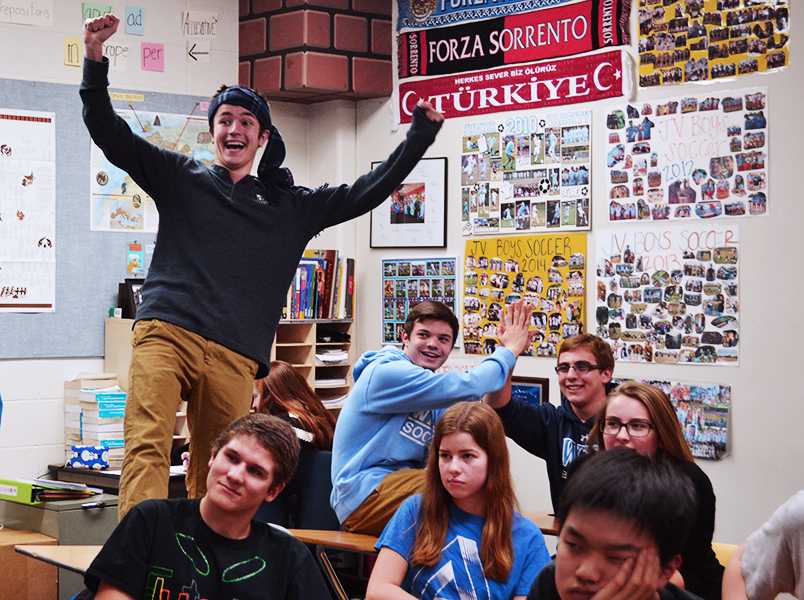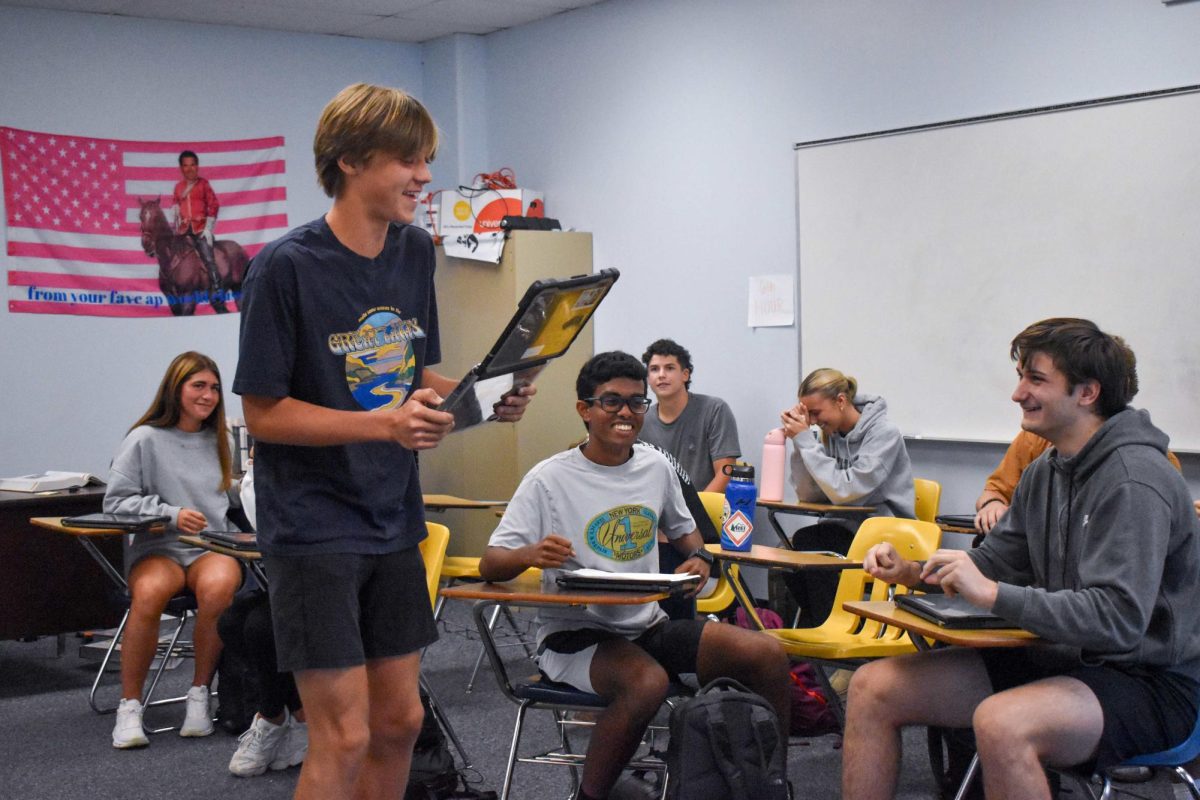If you stroll through the language department, you will see classrooms for four languages. Three of them, Spanish, German and French, are spoken by millions of people around the world. One of them is extinct: Latin.
Although the language is dead, students still choose to learn the language. In fact, Latin students , brought back the Latin Club after a four-year hiatus.
“This year has seen a tremendous resurgence in Latin Club interest. We consistently have about 25 student participants at the meetings with an executive board of eight students,” Latin teacher Tom Herpel said. “It is very exciting.”
The club began meeting on Tuesdays in mid-November, after sophomores Andrew Sunarto and Brian Zhang talked with Herpel about reinstating the club. Soon after, the club started posting flyers for meetings around the school.
‚ÄúOne day Herpel was talking about Latin Club in previous years, so I decided to start Latin Club up again,‚Äù ¬ÝSunarto said. ‚ÄúI didn‚Äôt want to run it, I just wanted to be in the group.‚Äù
Although the majority of the group is Latin language students, the club emphasizes that anybody can join.
“The Latin Club is all about having fun,” senior Hosein Saboorizadeh, co-president alongside senior Will Neary, said. “Anyone can join and no knowledge of Latin is needed.”
The club follows a ‚ÄúRoman‚Äù organization of leadership, with an executive board including eight student positions total. Positions include a publications officer and two presidents. Almost exclusively upperclassmen such as Saboorizadeh and Neary hold positions, and club members refer to ¬ÝHerpel, their sponsor, as emperor.
“I am the secretary, also known in Latin as the quaesitor,” senior Maggie Dreyer-Schumert said. “I record everything that we do in Latin Club.”
The club is currently working to develop t-shirt designs, including a shirt featuring “SPQR”, meaning “The Senate and People of Rome.” Inspiration for the idea came from tattoos that Roman soldiers historically would have on the side of one shoulder.
Other historical events are also incorporated into the meetings.
“We are planning to do gladiator fights,” Dreyer-Schumert said.
So far the club has voted on a motto, watched movies relating to ancient history and held a Latin trivia contest. Students also bring in food to enjoy during meetings.
“We have planned to make the club both an entertaining active experience as well as an educational medium,” junior Steven Ou said.
Although the club strives to plan fun activities and entertain members, there is also a level of academic focus. Before finals, the club held a study session during which upperclassmen could help lower-level students and offer answers to questions.
Additionally, Latin words have similar word structure and meanings to English, and students say that studying Latin has helped them in Communication Arts.
“Latin also makes English a much easier language, just because of vocab,” Neary said. “Take a Latin word, add a prefix or suffix, and, all of the sudden, you probably have an English word.”
Although it is regarded as a ‚Äúdead language,‚Äù meaning that it no longer has native speakers, ¬ÝHerpel believes Latin can still improve students‚Äô education.
“A common Latin misconception is that its status as a ‘dead language’ denies students from gaining the benefits of experiencing a language course,” Herpel said. “Regardless of whether the language is spoken in class or not, private and public school students can gain numerous lifelong skills.”
It is also a common myth, members say, that Latin is more difficult than other languages.
“It’s not more difficult, just different because we don’t speak it as much,” Dreyer-Schumert said.
Herpel thinks Latin is a very special language, for many reasons.
“There is a reason why mottos are written in Latin, Latin phrases appear on currency,” Herpel said. “Latin authors are quoted, and all known species of life have Latin names.”
And according to Dreyer-Schumert, the reason is simple.
“Latin is cool,” Dreyer-Schumert said.




![Freshman Daphne Stokes looks at a table with Veterans Day flyers and information on Nov. 11. Stokes, along with other West High students, like senior Alexander Lewinski, passed by the table in the cafeteria with army recruitment information and giveaways for students to observe during lunch. “Talking with [the recruiters] has definitely helped me [find] where I wanted to go, more than anything else,” Lewinski said.](https://pwestpathfinder.com/wp-content/uploads/2025/11/DSC_1227-2-1200x800.jpg)
![Helping a customer, print room assistant Gretchen Williams operates her booth at the West High Craft Fair from Oct. 25-26. This was Williams’ first time participating in the Craft Fair with her new craft shop, Gs Beaded Boutique. “People have always said, over the years, ‘you should open something.’ [I replied that] I would rather just make [my crafts as] gifts for people. I just started [the online store] up, and it's been okay. I'm always surprised [by] how many views I get and [the] people from different states buying things; somebody from Alaska bought something the other day.”](https://pwestpathfinder.com/wp-content/uploads/2025/11/DSC0451-2-1200x799.jpg)
![Gesturing toward the club’s name on the board, Global Youth Aid co-president year Daniah Alsagheer discusses upcoming service projects with members during a meeting on Oct. 30. “We might be one club at one school, but together, we’re [part of] something much bigger,” Alsagheer said.](https://pwestpathfinder.com/wp-content/uploads/2025/11/DSC00949-1200x800.jpg)
![Focused on providing exceptional service, sophomore Darsh Mahapatra carefully cleans the door of a customer’s car. Mahapatra has always believed his customers deserve nothing less than the best. “[If] they’re trusting us with their car and our service, then I am convinced that they deserve our 100 percent effort and beyond,” Mahapatra said.](https://pwestpathfinder.com/wp-content/uploads/2025/10/DSC_0018-1200x800.jpg)
![Sophomore Aleix Pi de Cabanyes Navarro (left) finishes up a soccer game while junior Ava Muench (right) warms up for cross country practice. The two came to Parkway West High School as exchange students for the 2025-2026 school year. “The goal for the [exchange] program is to provide opportunities for both Parkway students and our international exchange students to learn about other cultures, build connections and become confident, capable, curious and caring — Parkway’s Four C’s — in the process,” Exchange Program Lead Lauren Farrelly said.](https://pwestpathfinder.com/wp-content/uploads/2025/10/Feature-Photo-1200x800.png)

![Gazing across the stage, sophomore Alexis Monteleone performs in the school theater. The Monteleone family’s band “Monte and the Machine” has been releasing music since 2012, but Alexis started her own solo career in 2024 with the release of her first single, Crying Skies. “My whole family is very musical, [and I especially] love writing [songs with them],” Monteleone said.](https://pwestpathfinder.com/wp-content/uploads/2025/09/DSC7463-1200x798.jpg)
![Amid teaching a lesson to her AP Calculus BC class, Kristin Judd jokes alongside her students in their funny remarks. Judd has always enjoyed keeping the mood light in her classroom, along with on the volleyball court. “[I enjoy] that side talk where you see [or] overhear a conversation and chime in, or somebody says something funny,” Judd said.](https://pwestpathfinder.com/wp-content/uploads/2025/09/image-1200x730.jpg)
![Eyeing the ball, junior Ella McNeal poses for her commitment pictures at Clemson University. McNeal’s commitment comes after months of contact with top Division 1 soccer programs. “ It has taken a lot to get to where I am, but I know that [what] I've already been through is just the beginning, and I can't wait for what is to come,” McNeal said.](https://pwestpathfinder.com/wp-content/uploads/2025/09/IMG_4926-1200x900.jpeg)

![Sophomore Shree Sikkal Kumar serves the ball across the court in a match against Lindbergh. Sikkal Kumar has been a varsity member of the varsity girls’ tennis team for two years, helping her earn the number two rank in Class 2 District 2.“When matches are close, it’s easy to get nervous, but I [ground] myself by[staying] confident and ready to play,” Sikkal Kumar said.](https://pwestpathfinder.com/wp-content/uploads/2025/11/DSC2801-1200x798.jpg)
![Dressed up as the varsity girls’ tennis coach Katelyn Arenos, senior Kate Johnson and junior Mireya David hand out candy at West High’s annual trunk or treat event. This year, the trunk or treat was moved inside as a result of adverse weather. “As a senior, I care less about Halloween now. Teachers will bring their kids and families [to West’s Trunk or Treat], but there were fewer [this year] because they just thought it was canceled [due to the] rain. [With] Halloween, I think you care less the older you get,” Johnson said.](https://pwestpathfinder.com/wp-content/uploads/2025/10/DSC00892-1-1200x800.jpg)
![Leaning on the podium, superintendent Melissa Schneider speaks to Parkway journalism students during a press conference. Schneider joined Parkway in July after working in the Thompson School District in Colorado. “My plan [to bond with students] is to get things on my calendar as much as possible. For example, being in [classes] is very special to me. I am trying to be opportunistic [meeting] kids [and] being in [the school] buildings. I have all the sports schedules and the fine arts schedules on my calendar, so that when I'm available, I can get to them,” Schneider said.](https://pwestpathfinder.com/wp-content/uploads/2025/09/IMG_5425-1200x943.jpeg)

![Leaping through the air, senior Tyler Watts celebrates his first goal of the season, which put the Longhorns up 1-0 against the Lafayette Lancers. Watts decided to play soccer for West for his last year of high school and secured a spot on the varsity roster. “[Playing soccer for West] is something I had always dreamed of, but hadn’t really had a good opportunity to do until now. It’s [really] fun being out [on the field], and I’m glad I decided to join the team. It’s just all about having fun with the boys and enjoying what time we have left together,” Watts said.](https://pwestpathfinder.com/wp-content/uploads/2025/09/DSC_1951-1200x855.jpg)

![Shifting global trade, President Donald Trump’s tariffs are raising concerns about economic stability for the U.S. and other countries alike. “[The tariffs are] going to pose a distinct challenge to the U.S. economy and a challenge to the global economy on the whole because it's going to greatly upset who trades with who and where resources and products are going to come from,” social studies teacher Melvin Trotier said.](https://pwestpathfinder.com/wp-content/uploads/2025/05/MDB_3456-1200x800.jpg)

![Pitching the ball on Apr. 14, senior Henry Wild and his team play against Belleville East. Wild was named scholar athlete of the year by St. Louis Post-Dispatch after maintaining a high cumulative GPA and staying involved with athletics for all of high school. “It’s an amazing honor. I feel very blessed to have the opportunity to represent my school [and] what [it] stands for,” Wild said.](https://pwestpathfinder.com/wp-content/uploads/2025/05/unnamed-6-1200x714.jpg)
